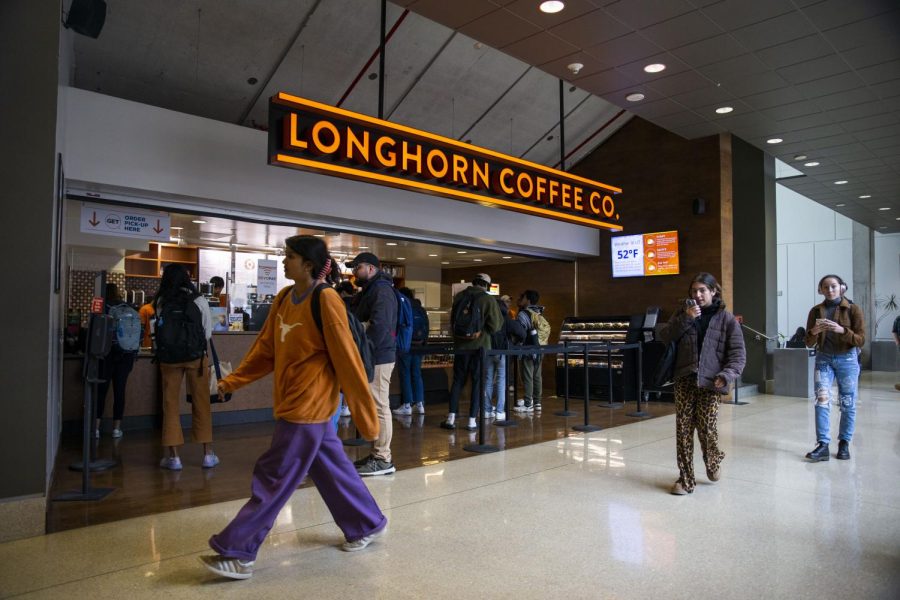On-campus workers face low wages, high living costs
Students walk past Longhorn Coffee Co in the WCP. Longhorn Coffee Co, which is run by Housing and Dining, pays students a minimum of $13/hr.
February 17, 2023
Since 2009, inflation has gone up 39.35% and the median cost of rent in Austin has risen by nearly $400 per month. However, over the past 14 years, UT’s minimum wage for student jobs has remained the same.
Veronica Trevino, assistant director of issues management for Financial and Administrative Services at UT, said in an email that all student wages are equal to or more than the federal minimum wage of $7.25 an hour. However, given inflated costs of living, some students with low wages at their campus jobs said they struggle to afford Austin.
Journalism junior Amberlyn Negron, who works as a hospitality desk student assistant and the editor-in-chief of the Cactus yearbook, said she’s had to make financial sacrifices.
“It’s definitely not an amount of money that you could pay for an apartment with,” Negron said. “I do find myself at times where I’m like, okay, we cannot go to H-E-B to get food.”
Negron makes $10 an hour as a student assistant and receives a stipend of $300 a month at the Cactus. She said she had to pick up an extra job this school year to afford living costs.
“I was going to be losing some income from my parents,” Negron said. “The pay wasn’t going to be enough if I needed to pay any extra expenses, so this year, I took on a second job”
On-campus workers are also regularly paid less than their non-student counterparts. The starting wage for students at UT Housing and Dining is $13 an hour, while non-student staff in both full and part-time positions are paid at least $18 an hour for the same positions.
Austin’s standard living wage was increased last October to $20 an hour.
According to the UT Human Resources website, only six out of 15 job categories available to undergraduates list a potential maximum pay rate at or above $20 an hour. Each department chooses hourly rates that fall within a minimum and maximum rate for each job category. For every undergraduate job category currently listed, the minimum rate is at or below $10.40 an hour.
Additionally, on-campus workers can only work a certain amount of hours per week. Students in undergraduate academic positions can work a maximum of 20 hours per week during the semester, while students in non-academic positions are allowed to work up to 40, although departments often apply limits.
An international student worker who wished to remain anonymous for employment reasons said she is unable to generate a sustainable level of income from working 20 hours per week.
“My expenses are very high,” she said. “Current wages for on campus jobs aren’t enough … and I’m only allowed to work on campus.”
Psychology sophomore Julia Rodriguez works as a student manager at Prufrock’s Coffee at the Perry-Castañeda Library. Rodriguez, who gets paid $15 an hour and cannot accept tips, said students cannot afford to live in Austin at this rate of pay.
“I don’t think we make enough to cover rent each month,” Rodriguez said. “I just don’t think it supports someone living.”
Student workers can access the same health plans and resources as all students can, but undergraduate employees are not eligible for UT employee insurance plans unless they qualify under the Affordable Care Act, according to the Human Resources website.
Additional benefits can be granted depending on departments and positions, but Rodriguez’s job only offers one benefit.
“We get free lunch,” she said. “But it’s only on the days that you work.”












